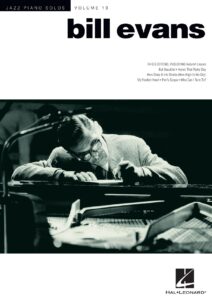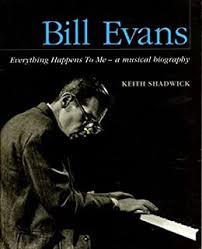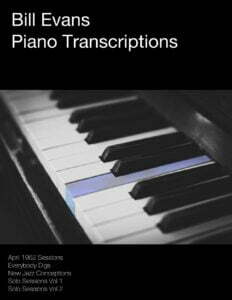Come join us now, and enjoy playing your beloved music and browse through great scores of every level and styles!
Can’t find the songbook you’re looking for? Please, email us at: sheetmusiclibrarypdf@gmail.com We’d like to help you!
Table of Contents
Who was Bill Evans?
From the point of view of pure technique, Bill Evans, (New Jersey, August 16, 1929 – New York, September 15, 1980), is possibly one of the two or three most gifted pianists in the history of jazz.
His career began in 1954, once he had completed his military service, in dance orchestras such as those of Herbie Fields and Jerry Wald, accompanying obscure singers or being part of Tony Scott’s band. Guitarist Mundell Lowe notably contributed to relaunching his career when he hired him for his group after hearing him in New Orleans, where Evans had studied music. In a very short time, much more significant musical associations were produced, as witnessed by his albums with Charles Mingus in 1957 (East Coasting), with Art Farmer in 1958 (Modern Art), with Lee Konitz in 1959 (Lee Konitz meets Jimmy Giuffre) or with Oliver Nelson in 1960 on the splendid album (The Blues and The Abstrach Truth).
In 1958, Bill Evans had already received the award for “revelation pianist” from Down Beat magazine, which confirmed his splendid career. But of all his collaborations as a sideman, two stand out in a very special way above the others. The first was with arranger George Russell, along with other innovative musicians such as Art Farmer on trumpet and Hal Mckusick on alto sax. “Concerto for Billy The Kid” included on RCA’s “Jazz Workshop” in 1956 offers one of his first important solos, of such constructive perfection that Russell was inspired by it to create the no less striking “All about Rosie” the year following.
His time in the Miles Davis sextet is equally decisive. Upon hearing him in Mingus’s group, Miles was so impressed that he hired him, knowing the fruit he could get from that pianist after the dissolution of his unsurpassed quintet in the mid-fifties. Thus was born in March 1959 the extraordinary album “Kind of Blue”, a record that has become without a doubt one of the classics in the history of jazz. But Evans said a friendly goodbye to Miles Davis and continued on his way alone.
In 1959, he recorded for the first time under his name under the premonitory title of “New Jazz Conceptions”, an album that hinted at what would come later, but only sold eight hundred copies. His second album, the also extraordinary “Everybody Digs Bill Evans” did obtain the favor of the public, but his legacy for jazz posterity did not arrive until he formed the musical collaboration with drummer Paul Motian and double bassist, Scott LaFaro. In just under two years (December 1959-June 1961) this alliance between peers revolutionized the concept of the piano trio, by proposing the abandonment of the old scheme of accompanists in front of the main soloist and replacing it with a three-way dialogue with perfectly complementary voices.
With that trio he recorded four albums of extraordinary quality, the most successful being the very famous “Waltz for Debby” (Riverside 1961) recorded at the Village Vanguard in New York. With the physical disappearance of LaFaro, Bill Evans, he suffered a severe blow and found that replacing him was impossible even though he managed, along with Chuck Israels and drummer Larry Bunker, some quality records. Among his recordings, the meeting with the singer Tony Bennett stands out, in the seventies, which produced two major works in the history of vocal jazz and among his solo piano albums, we must inevitably mention the famous “Conversations With Myself” and its continuation of 1967; the titled “Alone” which won a Grammy Award and “Alone (Again)”.
When Bill Evans died on September 15, 1980, from liver failure as a result of his drug addiction, he was fifty-one years old and had been among the elite of his instrument for more than twenty. The “piano poet” as the writer, Gene Less, defined him, kept his lyrical style and sensitivity intact until his last days.
Bill Evans Jazz Piano transcriptions (sheet music)
Please, subscribe to our Library.
If you are already a subscriber, please, check our NEW SCORES’ page every month for new sheet music. THANK YOU!
MIDNIGHT MOOD – Joe Zawinul (as played by Bill Evans) with sheet music

Contents List download:
Bill Evans – Blue in Green (piano solo sheet music transcription) with sheet music
Best Sheet Music download from our Library.
Waltz for Debby – Bill Evans
Bill Evans plays Emily (with sheet music transcription)


Bill Evans plays Reflections in D with sheet music
Bill Evans plays Midnight Mood transcription with sheet music
Bill Evans – Like Someone In Love – Piano Transcription (Sheet Music )

Sheet Music download here.
Browse in the Library:
Or browse in the categories menus & download the Library Catalog PDF:
